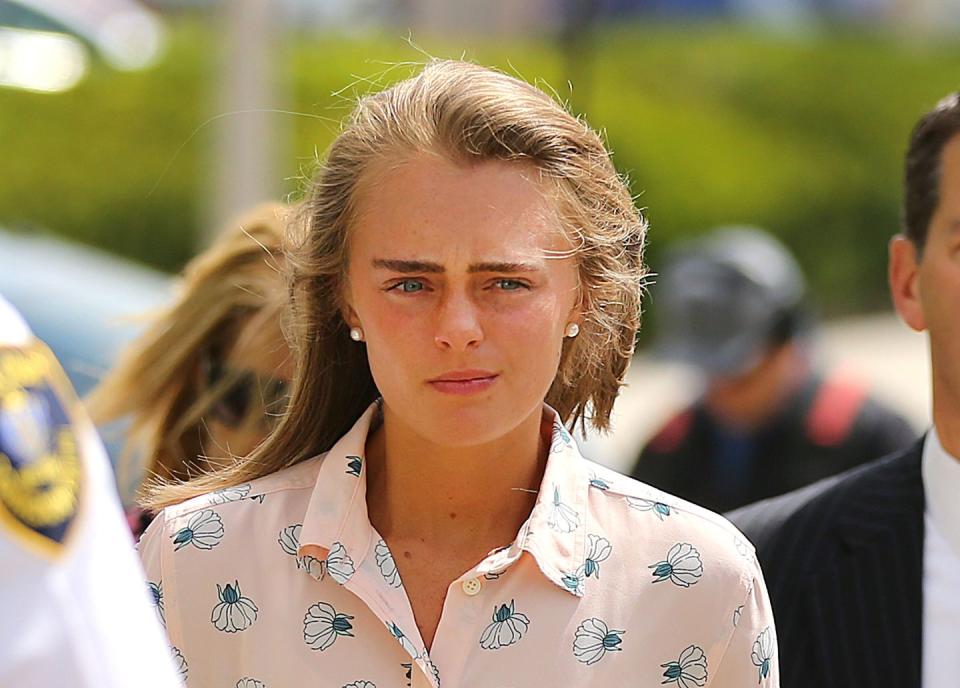The Prosecution And Defense Have Wildly Different Theories About Michelle Carter’s Motives

On July 13, 2014, the body of 18-year-old Conrad Roy III was found dead in his grandfather's pickup truck in the back of a Kmart parking lot in in Fairhaven, Massachusetts. He had committed suicide by attaching a hose from a portable generator and filling the truck with poisonous carbon monoxide, according to People. But Roy hadn't done it alone—he'd had encouragement from his girlfriend, then 17-year-old Michelle Carter.
She lived in Plainville, Massachusetts—an hour or so away from Fairhaven—but the couple had only met a handful of times after meeting in Florida while on their respective family vacations in 2012. However, they had exchanged thousands upon thousands of texts—more than 1,000 just in the week leading up to Roy taking his own life, People reported. In Carter's texts to Roy, she time and again encouraged him to commit suicide and even helped him plan out how exactly he was going to do it.
After police originally discovered the texts and phone calls between Carter and Roy in 2014, she was charged with involuntary manslaughter.
Now, those texts, phone calls, and the controversial trial that resulted are the focus of a new HBO documentary, I Love You, Now Die: The Commonwealth v. Michelle Carter, the first part of which premiered on July 9.
The second part—"The Defense"—premieres on July 10 at 8 p.m. ET. Overall, the film reexamines the case, attempting to get inside the head of Carter and figure out why she could have convinced someone she claimed she loved to kill himself.
But first, what was Michelle Carter's sentence?
After a legal fight that spanned five years, Juvenile Court Judge Lawrence Moniz found Carter guilty and sentenced her to two and a half years in prison in June 2017.
In the judge's ruling, it wasn't the texts Carter sent Roy, but the phone call he made to her during his suicide attempt—in which she allegedly told him to get back in the truck—that constituted "wanton and reckless conduct," making Carter criminally responsible for Roy's suicide. He further noted that she alerted neither Roy’s family nor local authorities to his actions even though she knew Roy intended to commit suicide.
Carter was able to remain out on bail during her lawyer's initial appeals process until the Massachusetts Supreme Judicial Court ruled not to overturn her conviction on February 6, 2019.
Then, Moniz ordered Carter—now 22—to begin serving her prison sentence at the Bristol County Jail and House of Correction. Nonetheless, Carter’s attorney, Joseph Cataldo, is currently in the process of preparing an appeal to the U.S. Supreme Court.
Watch Michelle Carter's conviction and sentencing:
But—even with Carter behind bars—the question still remains:
Why did Michelle Carter do it?

Well, as both the original trial and new documentary reveal, there are a few theories:
1. She did it on purpose.
This was how the prosecution and the media often portrayed Carter. "It was the defendant on the other end of the phone who ordered him [Roy] back in, then listened for 20 minutes as he cried in pain, took his last breaths, and died," the prosecution's cocounsel Maryclare Flynn said during Carter's trial, as shown in I Love You, Now Die. "...She pushed him to kill himself sooner rather than later, and she used Conrad as a pawn in their sick game of life and death."
That characterization is at least somewhat supported by Carter's original reaction to the police finding her at high school, which they recorded and is Carter's only on record statement about the case. When the police asked whether she'd had contact with Roy on the day he passed, Carter said, "I think so." According to her initial account, Carter and Roy were talking on the phone the night of July 12th, and then, the phone hung up. "I didn't really think anything of it. I didn't really know what to do," she said. "I was just scared for him because I had a feeling that this would come up at some point."
Having previously secured search warrants for Carter's phone, they soon found that Carter had lied to them about her involvement, or rather lack thereof, in Roy's death. In fact, as one officer said in I Love You, Now Die, their gut reaction to Carter's texts was: "If it wasn't for her, he's alive today."
But perhaps the most revealing—and damning—evidence that makes Carter seem like a teenage femme fatale was a text she sent to her friend Samantha Boardman, obtained by the prosecution and submitted as evidence. She wrote: "Sam his death is my fault like honestly I could have stopped him I was on the phone with him and he got out of the car because it was working and he got scared and I fucking told him to get back in."
2. She wanted to play the role of "grieving girlfriend."
While the prosecution mainly focused on the "get back in" part of Carter's text, which would ultimately seal her fate, they generally disregarded the part where she blamed herself for his death, likely because they believed it wasn't genuine.
Many believed Carter convinced Roy to kill himself so she could play the role of the grieving girlfriend in order to get attention, and there were many texts that supported this assessment. Carter messaged Camdyn Roy, Conrad's sister, an hour after his death, asking her if her mom knew where he was, according to Camdyn Roy's testimony during the trial.
In subsequent texts on July 13th, Carter asked Camdyn, "Find him yet?" to which she replied, "No." She neglected to tell any of Roy's family that she'd spoken to him on the night of his death or knew anything about his whereabouts.
Then, a day later, Carter texted Camdyn again: "Hey love, please talk to me if you need to. I want to do everything I can to help you and your family thru this difficult time." She later asked Camdyn if she could have some of Roy's ashes after learning he'd been cremated.
Carter also texted Roy 80 times after he died:
But what makes this theory most convincing are the texts Carter sent to Sam Boardman on July 10, 2014—two days before Roy's suicide. "He's missing like they don't know where he is," she wrote.
"She [Carter] knew her plan to get attention would work because she pre-tested it... texting several girls that Conrad had gone missing, while simultaneously texting and talking with Conrad, telling him to go by the gas machine," Flynn said during trial.
Carter also texted Boardman, "It's all my fault. I was supposed to save him he needed me. I let him down." Her friend told her not to blame herself and offered her comfort.
"They are paying attention to her now, so she has to make it happen. She has to make him kill himself so that she can continue to get that attention and not be known as a liar," Flynn continued. "She has to be the grieving girlfriend to get the sympathy and attention that she believes she deserves."
After Roy's death, Conrad frequently posted on Facebook and Twitter how much she missed him and then organized "Homers for Conrad," a baseball tournament to raise money for mental health awareness.
Roy's friends and family were confused that the tournament was being held in Carter's hometown, not his, but when asked to move it, she refused to. She even asked one of Roy's friends who suggested she move the tournament, "You're not taking credit for my idea right? lol."
3. She was a victim herself.
Roy wasn't the only one who suffered from anxiety and depression—Carter did, too. Both had gone through mental health struggles, and both had attended therapy and counseling, according to The Cut.
But Michelle wasn't just a victim of depression, according to Dr. Peter Breggin, MD, a clinical psychiatrist hired by the defense, she was also a victim of the medications that were meant to help her.
During his testimony, he explained that, in April 2014, a doctor changed Carter's prescription to five milligrams of the antidepressant Celexa, per Esquire. Breggin said that the drug contorted her natural inclination to help others, convincing Carter that assisting and encouraging Roy's suicide was actually a way to help him. He called this "involuntary intoxication," meaning she didn't know right from wrong, due to the drug's influence.
Watch Dr. Breggin's testify in court about Carter's state of mind:
During Bristol County Assistant District Attorney Katie Rayburn's cross-examination of Breggin, however, he had to admit that there was no section on involuntary intoxication in the Diagnostic and Statistical Manual of Mental Disorders (DSM). Instead, he said, "That's a legal term." Breggin did later say that involuntary intoxication was based on many clinical conditions that could be found in the DSM, but the fact remains that it is not an official mental health term.
Still, Carter's parents seemed to believe his assessment of their daughter. In a character statement David Carter later submitted to the court, he wrote:"I am convinced the medication she was taking affected her mental state which made it difficult for her to distinguish between right and wrong."
Though I Love You, Now Die strives to understand Carter's mental state that motivated her to write those texts to Roy, the only person who can ever truly understand why she did it is Carter herself. And, considering her silence throughout the trial and multiple appeals, it's likely that she'll stay mum while serving out the rest of her 15-month prison sentence.
('You Might Also Like',)

